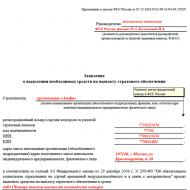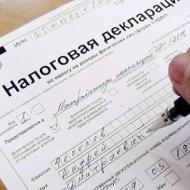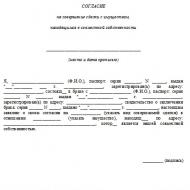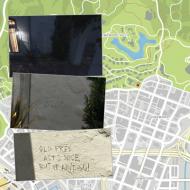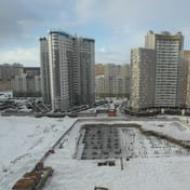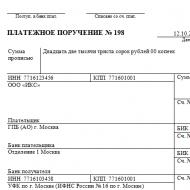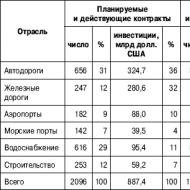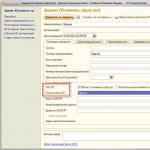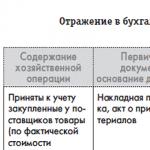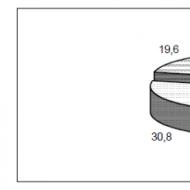
How is common property distributed in a communal apartment? Rules for living in a communal apartment: law, rights and obligations of residents, common areas, guests and neighbors Housing Law of Russia
1. Owners of rooms in communal apartment bear the burden of expenses for maintaining common property in this apartment.
2. The share of mandatory expenses for the maintenance of common property in a communal apartment, the burden of which is borne by the owner of the room in this apartment, is determined by the share in the right common property on common property in this apartment of the specified owner.
Commentary to Art. 43 Residential Complex of the Russian Federation
1. Owners of isolated residential premises in a communal apartment bear the burden of maintaining the residential premises in the communal apartment and the apartment itself that belong to them by right of ownership. The burden of maintaining residential premises in a communal apartment is expressed in the obligation of the owners to pay for services for the maintenance of residential premises and the common property of the communal apartment.
The amount of obligatory payments of each owner of residential premises in a communal apartment for the maintenance and repair of the residential premises owned by right of ownership and the common property of the communal apartment is proportional to his share in the right of common ownership of the common property in the communal apartment.
2. Payment for utility services is made for various reasons. For example, the criterion for paying for heating an apartment is the area of the entire apartment. Accordingly, the owner of a living space in a communal apartment pays for heating in proportion to his share in the right of common ownership of the common property of the communal apartment. In cases where the criterion for payment of utility services is the number of residents in the apartment (for example, water supply), then payment is made according to this criterion, without taking into account the owner’s share in the right of common ownership in the communal apartment.
3. The owner of residential premises in a communal apartment also has a share in the right of common ownership of common property apartment building, and accordingly he also bears the burden of maintaining the common property of the apartment building in proportion to his share (see commentary to Article 39 of the Housing Code).
According to Art. 41 of the Housing Code of the Russian Federation, the owner, in addition to the room used for the purpose of staying, in a communal apartment is the owner of a share in the operation of joint property included in shared ownership. In this case, the area of the part of the common property in a communal apartment is calculated strictly taking into account the square footage of the property that belongs to the owner. The size of the share is calculated in accordance with the legislative procedure. Therefore, each of the participants in legal relations experiences the burden of properly maintaining the premises in the communal apartment, which are listed as shared ownership.
Maintenance of living quarters in a communal apartment
The cohabitation of several persons in one communal apartment can cause numerous conflicts that arise on various grounds. In most cases, disputes are determined by the use of common infrastructure. Unfortunately, such situations can last for more than a decade, thereby complicating the lives of owners. This is due to the fact that not all owners of residential premises (rooms) have an idea about legislative framework, which regulates living together in such objects.
The maintenance of living space in a communal apartment is regulated by the regulatory principles of the Housing Code of the Russian Federation, namely, Art. 43. Specified legal norm states that when shared ownership exists, all room owners are required to pay taxes and utility bills. In addition, the owner is responsible for paying the additional financial costs required to maintain a livable condition in a communal apartment, but their calculation is determined by the size of the share withdrawn from the common property.
Burden of maintaining common property
The residential complex implies a mandatory nature for all owners to bear the burden of maintaining acceptable conditions in the jointly used property in apartment building. Such a burden is expressed in material form, in other words, all owners of premises must pay for services that are calculated on the common property in a communal apartment.
The amount of all required contributions is calculated in proportion to the share of living rooms in communal apartments owned by the owner and the premises in joint shared use.
However, here it is necessary to distinguish between cases when a fee is charged to maintain the premises in a condition suitable for people to stay in a communal apartment, from the cases when the property is listed in common shared ownership.
The first option implies that all owners of the premises are recognized as shareholders of a single object, and therefore jointly take part in ensuring the proper condition of the apartment. In the case of communal apartments, each of the owners is a separate owner of a living room, in other words, he himself bears the burden of maintaining them.
To put it simply, if one participant is the master in two room apartment communal floor plan of 20 sq. m, and the other person has a room of 10 sq.m., then the shares are distributed as follows:
- the first owner has a share of 2/3;
- the second owner, respectively, 1/3 of the share.
Thus, based on the legislation of the Russian Federation, each of these two room owners bears the burden of proportionately 2/3 and 1/3 of the share in the communal apartment.
The burden of expenses for maintaining the common property of a communal apartment
The common property of the owners of rooms in a communal apartment is determined on the basis of the Government Decree, which was issued on July 30, 2004. These objects include:
- kitchen area;
- sanitary rooms;
- utility rooms and other premises;
- corridors;
- engineering equipment and communication networks.
At the same time, the use of joint property implies the formation of both the rights and obligations of all owners of the premises. This includes the burden of additional costs for maintaining common property in a communal apartment. In this case, the amount of financial costs, if there is use of common property in a communal apartment, is calculated as the price of services or repairs, which is multiplied by the size of the occupied living space.
Reasons for paying utility bills
The procedure for paying for utilities in a communal apartment is calculated based on the principle of maintaining joint property. The fee distribution mechanism can occur in two ways:
- by agreement between the room owners;
- without agreement between the owners of the premises.
Payment of utilities in a communal apartment and calculation of costs through an agreement implies a certain procedure for the operation of joint property. For example, if a telephony facility is installed on the territory of a communal apartment, which can be operated collectively, then the maintenance costs are distributed evenly among all participants in accordance with the concluded agreement. This principle also applies to the heating and gasification systems of the premises.
If the operation of common property in a communal apartment does not imply the conclusion of an agreement between the owners of the rooms, then payment of utilities and its calculation involves the following procedure:
- Payment for electricity supply, if there are communal meters on the territory of a communal apartment, is calculated taking into account the power of installed electrical appliances and lighting fixtures for all room owners.
- The costs of telephony services for collective use are distributed taking into account the number of residents of all premises that use the device. In this case, payment for roaming is carried out separately.
- If heating devices are installed, the calculation of utilities takes into account the area of the premises where they are installed.
- Gas fees apply to all residents of a communal apartment, regardless of their age.
Each owner of a residential property is responsible for timely payment of utility bills, including for the collective property of homeowners in a communal apartment. If the owner of the living space is away, that is, he is not in this moment consumer of utility services, then the legislation of the Russian Federation provides for compensation.
Problems related to the maintenance of common property
The common property of the owners of premises in a communal apartment may become a subject of contention between the participants in legal relations. Conflict situations in such cases are resolved only in court, which provides for legislative procedure.
Based on a court decision, a specific agreement is drawn up between the owners, which is aimed at a fair distribution of costs. In this case, the fact of using certain resources is taken into account, the volume of which is recorded by metering devices installed in a communal apartment. If there are no meters, then the court can take unit costs as a basis for calculating payments, which are calculated individually for each utility resource in accordance with consumption standards.
Question answer
Free online legal advice on all legal issues
Ask a question for free and get a lawyer’s answer within 30 minutes
Ask a lawyer
Hello. I live in a 3-room apartment and am the owner of only one of them. The second owner owns the remaining two. The neighbor refuses to make repairs in the common areas, although they are already completely unsuitable for use. Mold on the walls in the bathroom, terrible walls and the bathroom itself. I propose to do it in half, although I understand that I am the owner of a smaller share. Is it possible to somehow influence her through a lawsuit? The situation brings not only a desire for the aesthetic appearance of common premises, but also concern for life and health, because mold and old wiring do not inspire confidence in safety.
Yulia 06.24.2019 19:44
Engineering systems in a communal apartment
Good evening, I live in a communal apartment. We have 2 families and 2 bathrooms. They are separated by a wall and communications pass from the neighbor’s side and come to me through sleeves in the wall. The neighbor is going to give his part of the communal apartment the status of an apartment in order to install meters for water supply and electricity and, as he thinks, pay less for utilities. At the same time, he declares that I must install water supply communications myself at my own expense, because when he installs the meters, he will cut me off (the pipes are on his side, after all). How right are his actions?
Evgeniy 11/22/2017 10:46 pm
Hello Evgeniy! Recognize the utility. apartment is possible only after authorized reconstruction or legalization of such reconstruction in court. Those. Without judicial permission or the permission of the authorities responsible for this type of activity, his actions are illegal and are subject to both administrative and, in some cases, criminal liability.
Fedorova Lyubov Petrovna 23.11.2017 15:48
Ask an additional question
You will also find the following articles useful
- Eviction of citizens from specialized residential premises
In accordance with Part 1 of Art. 43 of the Code, the owners of rooms in a communal apartment bear the burden of expenses for maintaining the common property in this apartment.
Article 43 reproduces the fundamental provisions of Art. 39 of the Code regulating the maintenance of common property in an apartment building, in relation to the maintenance of common property in a communal apartment. Like the owners of residential and non-residential premises in an apartment building, the owners of rooms in a communal apartment are required to bear the costs associated with the maintenance of their common property, which is in shared ownership.
The share of mandatory expenses for the maintenance of common property in a communal apartment, the burden of which is borne by the owner of a room in this apartment, is determined by the share in the right of common ownership of the common property in this apartment of the specified owner.
Chapter 4. Mandatory payments § 1. Payment for residential premises and utilities
A legal obligation has been established to pay for housing and utilities for the persons listed in Art. 153 of the Code, and also determines the moment when this obligation arises for each category of specified persons. Thus, the owner of a residential premises has an obligation to pay for residential premises and utilities from the moment the right of ownership to the residential premises arises.
A novelty of the Code is the regulatory definition of the structure of payments for residential premises and utilities (Article 154). At the same time, the structure of payments for housing and utilities is determined differently for three categories of users of residential premises: a) tenants of residential premises of the state and municipal housing stock under social and commercial tenancy agreements; b) owners of premises in an apartment building (including members of housing and housing-construction cooperatives who have paid the share contribution in full); c) owners of residential buildings.
For the owner of premises in an apartment building, payment for residential premises and utilities includes:
utility fees.
For owners of residential buildings (multi-apartment and single-family residential), the actual payment for the houses they own are the costs of their maintenance and repairs. Such owners pay for utilities in accordance with agreements concluded with persons engaged in the relevant types of activities.
Please note that for some categories of users of residential premises the Code has not determined the structure of fees for residential premises and utilities. Consequently, the composition of such a fee will in specific cases be determined solely by the terms of the relevant agreement (for example, a lease agreement or commercial rental of residential premises in a private housing stock).
At the same time, for all categories of users of residential premises, including those for whom the Code does not define the structure of payment for residential premises and utilities, the imperative norm establishes a single content of the concept of “payment for utility services.” In accordance with Part 4 of Art. 154 of the Code, the specified fee includes payment for cold and hot water supply, sewerage, electricity supply, gas supply (including the supply of domestic gas in cylinders), heating (heat supply, including the supply of solid fuel in the presence of stove heating).
Such a fairly detailed legal regulation of the structure of payments for residential premises and utilities at the level of federal law, from our point of view, can be considered one of the advantages of the new Code. It should contribute, on the one hand, to the development of contractual principles in the regulation of housing relations and the reduction of “space” for administrative discretion in this area, and on the other hand, to prevent arbitrary interpretation of the relevant concepts by the parties to housing contracts.
The procedure for paying for residential premises and utilities is defined in Art. 155 of the Code. This procedure is differentiated for different categories of users. However, all of them are required to pay for housing and utilities monthly by the tenth day of the month following the expiration of the month, unless a different period is established by the apartment building management agreement. Payment for residential premises and utilities is made on the basis of payment documents submitted no later than the first day of the month following the expiration of the month, unless a different period is established by the management agreement for the apartment building.
Members of a homeowners' association or a housing cooperative or other specialized consumer cooperative created to meet the needs of citizens for housing in accordance with the federal law on such a cooperative make mandatory payments and (or) contributions related to the payment of maintenance costs, current and major repairs common property in an apartment building, as well as with payment of utilities, in the manner established by the governing bodies of the homeowners' association or the governing bodies of a housing cooperative or the governing bodies of another specialized consumer cooperative.
Owners of premises in an apartment building in which a homeowners association or a housing cooperative or other specialized consumer cooperative is not a member of a homeowners' association or a housing cooperative or other specialized consumer cooperative pay payment for residential premises and utilities in accordance with agreements concluded with a homeowners' association or a housing cooperative or other specialized consumer cooperative.
Owners of premises in an apartment building in which a homeowners' association or housing cooperative or other specialized consumer cooperative has not been created and which is managed by a management organization, pay fees for residential premises and utilities to this management organization.
Owners of premises in an apartment building who directly manage such a building (see Articles 161, 164 of the Code) pay for residential premises and utilities in accordance with agreements concluded with persons carrying out the relevant types of activities.
Owners of residential buildings pay for services and work on their maintenance and repair, and also pay for utilities in accordance with agreements concluded with persons engaged in the relevant types of activities.
Owners of premises in an apartment building pay for services and work on the maintenance and repair of these premises in accordance with agreements concluded with persons carrying out the relevant types of activities.
It is advisable to take into account that, according to Part 11 of Art. 155 of the Code, non-use of premises by owners, tenants and other persons is not grounds for non-payment of payment for residential premises and utilities. In the temporary absence of citizens, payment for certain types of utility services, calculated on the basis of consumption standards, is carried out taking into account the recalculation of payments for the period of temporary absence of citizens in the manner approved by the Government of the Russian Federation.
The management organization is obliged to inform in writing the owners of residential premises in an apartment building about changes in the amount of payment for residential premises and utilities no later than 30 days before the date of submission of payment documents, on the basis of which payment for residential premises and utilities will be paid in a different amount , unless a different period is established by the management agreement.
Payment for residential premises and utilities is also regulated by the Rules for payment by citizens of housing and utilities, approved by Decree of the Government of the Russian Federation of July 30, 2004 N 392 *(24) . The specified legal act is applied to the extent that does not contradict the Code (see Article 4 of the Introductory Law).
It is also important to pay attention to the fact that the Code established the legal (civil) liability of persons who did not timely and (or) not fully pay for housing and utilities (Article 155). Such persons are obliged to pay the creditor a penalty in the form of penalties in the amount of one three hundredth of the refinancing rate of the Central Bank of the Russian Federation, in effect at the time of payment, from the amounts not paid on time for each day of delay, starting from the next day after the due date for payment until the day of actual payment, inclusive.
At the same time, the mandatory norm of the Code introduced a ban on increasing the specified amount of penalties. Therefore, in the relevant housing contract it is possible to provide only a reduced one, compared to that provided for in Art. 155 of the Code, the amount of such a penalty. Changing the amount of penalties established by the Code, by the unilateral expression of the will of a party to a housing contract, without the consent of the other party should be considered impossible.
It appears that the provisions of Art. 155 of the Code cannot be interpreted restrictively: a penalty in the form of penalties is not provided for in it as an exclusive sanction (see paragraph 2, paragraph 1, article 394 of the Civil Code of the Russian Federation). Therefore, it is advisable to keep in mind that the civil liability of the debtor in such cases may not be limited to the payment of a penalty. It is also possible to impose on him the obligation to compensate the creditor for losses (if it is proven that they arose as a result of untimely and (or) incomplete payment for residential premises and utilities) in the part not covered by the penalty (see Articles 393, 394 of the Civil Code of the Russian Federation). Let us remind you that according to Art. 15 of the Civil Code of the Russian Federation, losses are understood as expenses that a person whose right has been violated has made or will have to make to restore the violated right, loss or damage to his property (real damage), as well as lost income that this person would have received under normal conditions of civil circulation , if his right had not been violated (lost profits).
The amount of payment for residential premises is determined in accordance with the provisions of Art. 156 of the Code. In this case, the fee for the maintenance and repair of residential premises is set in an amount that ensures the maintenance of common property in an apartment building in accordance with the requirements of the law. The criteria for establishing the amount of payment for the use of residential premises (rental fees), fees for the maintenance and repair of residential premises vary depending on the categories of users of residential premises, ownership of the housing stock and other circumstances specified in Parts 2-4 of Art. 156 of the Code.
Payment for the maintenance and repair of residential premises is established in an amount that ensures the maintenance of common property in an apartment building in accordance with the requirements of the law. The amount of payment for the maintenance and repair of residential premises for owners of residential premises who have not decided on the choice of method of managing an apartment building is established by local government bodies (in the constituent entities of the Russian Federation - the federal cities of Moscow and St. Petersburg - by the state authority of the corresponding constituent entity of the Russian Federation ).
The amount of payment for the maintenance and repair of residential premises in an apartment building in which a homeowners association or a housing cooperative or other specialized consumer cooperative has not been established is determined by general meeting owners of premises in such a house, which is carried out in the manner established by Art. 45-48 of the Code. The amount of payment for the maintenance and repair of residential premises in an apartment building is determined taking into account the proposals of the management organization and is set for a period of at least one year.
The amount of mandatory payments and (or) contributions of members of a homeowners association or a housing cooperative or other specialized consumer cooperative associated with the payment of expenses for the maintenance and repair of common property in an apartment building is determined by the management bodies of the homeowners association or the management bodies of the housing cooperative or the management bodies of another a specialized consumer cooperative in accordance with the charter of the homeowners’ association or the charter of a housing cooperative or the charter of another specialized consumer cooperative.
Changes in the amount of payment for the maintenance and repair of residential premises in the case of the provision of services and performance of work on the management, maintenance and repair of common property in an apartment building of inadequate quality and (or) with interruptions exceeding the established duration are determined in the manner established by the Government of the Russian Federation.
In addition to the provisions of the Code, determining the amount of payment for residential premises and utilities is subject to the rules established in the by-laws legal acts. For example, by Decree of the Government of the Russian Federation dated February 17, 2004 N 89, the Fundamentals of pricing in the field of housing and communal services were approved *(25) . IN last years The Government of the Russian Federation also sets federal standards for payment of housing and utilities for the corresponding year *(26) .
The amount of payment for utility services is determined based on the readings of metering devices, and in their absence - based on the standards for the consumption of utility services determined by local governments, and in Moscow and St. Petersburg - by state authorities. Payments for utility services are calculated on the basis of tariffs (prices) established by the authorities specified in Part 2 of Art. 157 of the Code.
At the same time, the basis for regulating tariffs of public utility organizations providing electricity, heat, water supply, water disposal and wastewater treatment, disposal (disposal) of solid household waste, as well as surcharges on prices (tariffs) for consumers and surcharges on tariffs for goods and services organizations of the public utility complex are determined by the Federal Law of December 30, 2004 "On the basis for regulating tariffs of organizations of the public utility complex" *(27) . In addition, when calculating fees for utility services, it is necessary to take into account other acts of current legislation *(28) . The principles of pricing for electrical and thermal energy in the Russian Federation were approved by Decree of the Government of the Russian Federation dated February 26, 2004 N 109 *(29) . The same resolution approved the Rules for state regulation and application of tariffs for electrical and thermal energy in the Russian Federation.
In accordance with Art. 157 of the Code, the rules for the provision of utility services are approved by the Government of the Russian Federation. At present, the Rules for the provision of utility services, approved by Decree of the Government of the Russian Federation of September 26, 1994 N 1099, continue to apply *(30) . They are valid to the extent that they do not contradict the Civil Code of the Russian Federation, the Code and the Law of the Russian Federation of 02/07/1992 as amended by the Federal Law of 01/09/1996 “On the Protection of Consumer Rights” *(31) .
Utilities paid by users of residential premises must be provided in accordance with established standards. Violation of the standard level or regime for providing the population utilities recognized as an administrative offense under Art. 7.23 of the Code of Administrative Offenses of the Russian Federation, which entails punishment of officials and (or) legal entities guilty of its commission in the form of a fine.
It is also advisable to keep in mind that citizens who are users of residential premises are considered as consumers of the work and services they pay for in the housing sector. Relations regulated by consumer protection legislation may arise from residential lease agreements, including social hiring, in terms of performing work, providing services to ensure the proper operation of the residential building in which this residential premises is located, to provide or ensure the provision of the necessary utilities to the tenant, to carry out routine repairs of the common property of the apartment building and devices for providing utilities *(32) . Therefore, in cases where the rights of consumers of work and services in the housing sector are violated, such citizens have the right to demand in court the recovery of a very large penalty from violators in cases provided for by the Law of the Russian Federation of 02/07/1992 as amended by the Federal Law of 01/09/1996 " On the protection of consumer rights" and use other methods of protecting your rights established in Art. 28-32 of the said Law of the Russian Federation.
According to Part 1 of Art. 41 of the Housing Code of the Russian Federation, the owners of rooms in a communal apartment own, by right of common shared ownership, the premises in this apartment used to service more than one room. Common areas in such apartments are: hallways, corridors, kitchens, storage rooms, bathrooms, etc.
Changing the size of common property in a communal apartment is possible only with the consent of all owners of rooms in this apartment through its reconstruction and (or) redevelopment (Part 2 of Article 41 of the Housing Code of the Russian Federation).
The share in the right of common ownership of common property in a communal apartment of the owner of a room in this apartment is proportional to the size of the total area of the specified room (Part 1 of Article 42 of the Housing Code of the Russian Federation).
This means that the larger the area of a particular owner’s room, the greater his share in the right of common ownership of the common property in the communal apartment.
Based on Part 2 of Art. 42 of the Housing Code of the Russian Federation, the share in the right of common ownership of common property in an apartment building of the owner of a room in a communal apartment is proportional to the following amount: the size of the total area of the room plus the size of the area of the premises constituting the common property in the communal apartment (which is determined in accordance with the share in the right of common ownership of common property in the communal apartment of this owner).
By virtue of Part 3 of Art. 42 of the Housing Code of the Russian Federation, the share in the right of common ownership of common property in a communal apartment of the owner of a room in this apartment follows the fate of the right of ownership of the room. When transferring ownership of a room, the share in the right of common ownership of common property in a communal apartment of the new owner of such a room is equal to the share in the right of common ownership of the previous owner of such a room.
The right of common shared ownership of the common property of a communal apartment arises by virtue of the acquisition of a room and does not require independent registration.
In accordance with Part 5 of Art. 42 of the Housing Code of the Russian Federation, the owner of a room in a communal apartment has no right:
- to allocate in kind your share in the right of common ownership of common property in a given apartment;
- alienate one’s share in the right of common ownership of common property in a given apartment, as well as perform other actions entailing the transfer of this share separately from the right of ownership of the specified room.
In accordance with Part 6 of Art. 42 of the RF Housing Code introduced the right of first refusal to purchase a room in a communal apartment: when selling a room in a communal apartment, the remaining owners of rooms in this communal apartment have a preferential right to purchase the alienated room at the price for which it is sold, and on other equal conditions.
The seller - the owner of the room is obliged to notify in writing the owners of other rooms of his intention to sell his room, indicating the price and other conditions. If the owners of other rooms refuse to purchase or do not purchase the room within one month, the seller has the right to sell his room to any person.
When selling a room in violation of the preemptive right to purchase, any of the owners of other rooms has the right, within 3 months, to demand in court the transfer of the rights and obligations of the buyer to him (Article 250 of the Civil Code of the Russian Federation).
The same rules apply when concluding a room exchange agreement. In the case of a sale at public auction, the right of first refusal does not apply, since the contract is concluded with the person who won the auction (Article 477 of the Civil Code of the Russian Federation).
The adoption of this norm (Part 6 of Article 42 of the Housing Code) is due to the need to reduce the number of communal apartments. However, the introduction of this norm into the RF Housing Code seems controversial for the following reasons. Pre-emptive right of purchase established by Art. 250 of the Civil Code of the Russian Federation, applies when selling a share in the right of common ownership to a third party. However, rooms in a communal apartment, like separate apartments, are independent objects of ownership. Therefore, they can be either in shared or joint ownership, and are not property that is subject to the rule of pre-emption.
By analogy with the maintenance of common property in an apartment building, the common property in a communal apartment is maintained at the expense of all room owners. Owners of rooms in a communal apartment bear the burden of expenses for maintaining common property in this apartment in proportion to their share in the right of common ownership of this property (Article 43 of the Housing Code of the Russian Federation).
According to Art. 249 of the Civil Code of the Russian Federation, each participant in shared ownership is obliged, in proportion to his share, to participate in the payment of taxes, fees and other payments on common property, as well as in the costs of its maintenance and preservation. In addition, they bear the burden of maintaining the common property of the owners of premises in the corresponding apartment building in proportion to their share.
Disputes between residents in an apartment where several owners live, related to the distribution of common expenses for utility bills, and the determination of the procedure for using common areas, are considered by the court. The owners of the rooms can, in an agreement on the distribution of the burden of expenses between the owners, determine the procedure for using common property in a communal apartment.
New edition of Art. 42 Residential Complex of the Russian Federation
1. The share in the right of common ownership of common property in a communal apartment of the owner of a room in this apartment is proportional to the size of the total area of the specified room.
Commentary on Article 42 of the RF Housing Code
1. The size of the share in the right of common ownership of common property in a communal apartment is determined based on the fact that the specified share is proportional to the size of the total area of the room belonging to the owner in this apartment. At the same time, the total area of the room belonging to the owner does not include the area of balconies, loggias, verandas and terraces (see Part 5 of Article 15 of the Code).
If in a communal apartment the owner owns two (or more) rooms, then it should be assumed that this circumstance in itself should not be taken into account when determining the size of his share in the right of common ownership, since the decisive factor in this case is not the number of living rooms, but their total area.
Thus, the shares of participants in common ownership in a communal apartment are not equal. Therefore in in this case the rules of civil law on shared rather than joint property apply. In this regard, it is advisable to keep in mind that the share of a participant in shared ownership can be increased according to the rules of the first paragraph of clause 3 of Art. 245 of the Civil Code of the Russian Federation, if this participant has carried out at his own expense inseparable improvements to the common property.
2. The owner of a room in a communal apartment, in addition to the right to a share in the ownership of the common property in this apartment, also has a share in the ownership of the common property in an apartment building. It is proportional to the sum of: a) the size of the total area of the specified room and b) determined in accordance with the share of this owner in the right of common ownership of common property in a communal apartment, the size of the area of the premises constituting the common property in this apartment.
3. In accordance with the principle underlying Part 2 of Art. 37 of the Code, part 3 of Art. 42 contains a mandatory rule on the succession of the share in the right of common ownership of common property in a communal apartment of the owner of the room to the fate of the right of ownership of the room belonging to this owner. In the event that the owner of a room in a communal apartment alienates his room to another person (sells, donates, exchanges, etc.), not only the ownership of the specified room, but also the ownership of the to the former owner share in the right of common ownership of common property in a communal apartment.
4. In cases where the ownership of a room in a communal apartment is transferred to another person on the basis of a transaction or by inheritance, the share in the right of common ownership of the common property in this apartment passes unchanged to the new owner.
5. Imperative norms, part 5, art. 42 of the Code prohibit the owner of a room in a communal apartment from committing actions that violate the principle that the share in the right of common ownership of the owner of a room in a communal apartment follows the fate of the ownership of the specified room (see Part 3 of Art.
Article 43 of the Housing Code of the Russian Federation. Maintenance of common property in a communal apartment
6. The right of first refusal is the right of participants in common shared ownership in relation to a share in their property sold to an outsider at the price for which it is sold, and on other equal conditions, except in the case of sale of such a share at public auction. Assignment of the right of pre-emption to purchase a share is not permitted.
According to Art. 250 of the Civil Code of the Russian Federation, public auctions for the sale of a share in the right of common ownership in the absence of consent to this from all participants in shared ownership can be held in cases provided for in Part 2 of Art. 255 of the Civil Code of the Russian Federation, and in other cases provided for by law.
The seller of a share is obliged to notify in writing the other participants in shared ownership of his intention to sell his share to an outsider, indicating the price and other conditions under which he sells it. If the remaining participants in shared ownership refuse to purchase or do not acquire the share in ownership of the property being sold real estate within a month from the date of notification, the seller has the right to sell his share to any person.
When selling a share in violation of the right of first refusal, any other participant in shared ownership has the right, within three months, to demand in court the transfer of the rights and obligations of the buyer to him.
The stated rules also apply when alienating a share under an exchange agreement.
In accordance with paragraph 1 of Art. 24 Federal Law dated July 21, 1997 N 122-FZ “On state registration rights to real estate and transactions with it" when selling a share in the right of common ownership to an outsider, documents are attached to the application for state registration confirming that the seller of the share notified in writing the other participants in shared ownership of his intention to sell his share, indicating the price and other conditions where he sells it.
The application for state registration may be accompanied by documents confirming the refusal of the remaining participants in shared ownership to purchase a share and drawn up by the body carrying out state registration of rights or notarized. In this case, state registration of the right to a share in common property is carried out regardless of the period that has passed since the seller notified the share to the remaining participants in shared ownership.
If the application for state registration is not accompanied by documents confirming the refusal of the remaining participants in shared ownership to purchase the share, the state registrar is obliged to suspend state registration until the expiration of a month from the date the seller of the share notified the remaining participants in shared ownership, if on the day of filing the application for state registration such the deadline has not expired.
Disputes between participants in shared ownership that arise during state registration of the right to a share in common property are subject to resolution in court.
Another comment on Art. 42 of the Housing Code of the Russian Federation
1. The share of the owner of the room (rooms) in the right of common ownership of the common property of a communal apartment is determined in proportion to the total area of the room (rooms). Calculation of the total area of the room: the area of the auxiliary premises is divided by the number of rooms in the communal apartment. The part of the auxiliary premises per room and the living area of the room gives (in total) the total area of the room. This area is the basis for determining the share in the right of common ownership of common property in a communal apartment - in proportion to the total area of the room.
2. A share in the right of common ownership of common property in a communal apartment is an integral part of the room and always follows the fate of the ownership of it. When the owner of a room changes, the share of the new owner in the right of common ownership is equal to the share of the previous owner.
The owner of a room in a communal apartment is deprived of the opportunity to allocate in kind his share in the right of common ownership of the common property of a communal apartment and to alienate it separately from the alienation of the room.
3. When selling a room in a communal apartment, the remaining owners of the rooms have a pre-emptive right to purchase this room in the manner and under the conditions established Civil Code RF.
The procedure for selling a share is as follows: the seller is obliged to notify in writing the owners of all other rooms in this apartment of his intention to sell his room, indicating the price and other conditions under which it is being sold. Any of the other owners has the right to buy it on these terms within a month; otherwise, the owner has the right to sell his room to any person (Article 250 of the Civil Code of the Russian Federation).
If the seller violates the preemptive right of the owners of other rooms, any of them may, within 3 months, demand the transfer of the rights and obligations of the buyer to him. To do this you need to go to court.
Today on the real estate market, developers only offer areas of approximately 30 square meters or more, and shared ownership allows you to purchase an area of 16 to 30 m2, much cheaper than the market price for an apartment. The cost of a share in an apartment with city registration in an already rented one finished house starts from 1,200,000 rubles, and this is not a room, but a studio with a control room and a kitchen. It’s realistic to buy an apartment from a developer, not large area, you can do it today, but you will only be able to live there in 2018. Our company has developed a package of documents that allows us to eliminate possible disadvantages of shared ownership at the stage of purchasing an apartment and allows us to regulate the legal relations of new owners among themselves within the framework of common ownership. You can start using and managing your property today.
1) Purchasing your share from 1 owner or developer company directly without intermediaries.
— there is no increase in the price of the object
- no risk of losing money
2) Notarial refusal from the priority right to purchase a share in the apartment from all future owners
- you can sell your share in the property without notifying all owners
— no need to wait a month for consent, because refusals have already been received and are stored by the notary
3) Notarized agreement on the procedure for using the apartment allocates your share of the property in square meters and determines your area on the apartment plan.
- regulates legal relations between owners
- such a document allows you to pledge a share to the bank
— the document determines the procedure for using common areas and allocates your property in common ownership
In fact, you get a separate studio apartment with your own control room and kitchen area in the studio.
1) Each studio is equipped with its own metered electricity network, which does not depend on your neighbors. The apartment has a common meter for the corridor and a separate one for your studio.
2) Own separate meters are installed for water.
3) The layout, as a rule, does not need to be legalized, because we don't dismantle load-bearing walls and we do not change the boundaries of the entire apartment. We do not install or locate wet areas above residential areas. Performs redevelopment entity according to GOSTs and SNIPs adopted in the Russian Federation and having the right and permission to perform this type of work. As follows from the law:
Based on Article 26 of the Housing Code of the Russian Federation, there is no need to obtain permission from the Housing Inspectorate and coordinate the project in order to carry out the following types works:
— installation of glazing on a loggia or balcony (but without changing the appearance of the facade);
- sealing or moving, expanding or reducing door openings in the internal partitions of the apartment, with the exception of load-bearing and inter-apartment partitions;
— demolition and installation of partitions that are not load-bearing and do not increase the load on the floors (wooden, plasterboard, less often brick, etc.);
— replacing the bathtub with a shower cabin;
- moving the stove within the kitchen.
4) With the above documents you receive:
allocated share in the property that you can ATTENTION!!!
- buy, sell, bequeath, donate, lease, obtain registration in this property, mortgage it to the bank. The only difference will be a common cadastral number with several owners. General mailbox. Agree for a 30% discount on the price for square meter, you can try to change your attitude towards this species property))
5) It is possible to legalize the redevelopment of an apartment at the request of the owners; as a rule, a project is required, permission for redevelopment; the cost of turnkey documents can be around 200,000 rubles for 1 apartment. And for a period from 2 months to six months.
NOTE:
As the housing code of St. Petersburg says, paragraph 6 of Art. 1 (Law dated July 16, 2001, No. 572-73, as amended on November 18, 2002): “ Communal apartment- this is an apartment of the state housing stock of St. Petersburg or the municipal housing stock, the residential premises in which are occupied under separate contracts (social tenancy, rental, lease) by two or more tenants (tenants) who are not spouses, parents, children or family members of the tenant" .
Housing law in Russia
Communal apartments also include apartments from the state housing stock St. Petersburg, meeting the requirements of this definition, in which part of the residential premises began to be the property of citizens, despite the fact that at least one premises (residential) is owned by the state. The Moscow Housing Code on communal apartments in Article 15 (Law dated March 11, 1998, No. 6, as amended on July 10, 2002) says this: “A communal apartment is an apartment consisting of several residential premises (rooms) belonging to two and more users and/or owners who are not members of the same family, on the basis of separate agreements, transactions, other actions provided for by law, sharing auxiliary premises (common areas of the apartment) and engineering equipment in common areas.”
CONCLUSIONS suggest themselves! Shared ownership allocated through a notarial agreement has nothing in common with a communal apartment.
Try to answer these questions for yourself:
Why legitimize redevelopment done in construction company according to GOST, if the law does not require it?
Why do you need your own separate cadastral number?
What's happened " common areas"in the apartment and "common areas" on the landing and how do they differ?
If an apartment building is built in shares according to the shared ownership agreement and no questions arise, why and what questions arise when living in common property?
Regime of common shared ownership in a communal apartment
The share in the right of common ownership of common property in a communal apartment of the owner of a room in a given apartment is proportional to the size of the total area of the specified room.
2. The share in the right of common ownership of common property in an apartment building of the owner of a room in a communal apartment located in this house is proportional to the sum of the dimensions of the total area of the specified room and determined in accordance with the share in the right of common ownership of common property in the communal apartment of this owner of the area premises constituting the common property in this apartment.
3. The share in the right of common ownership of common property in a communal apartment of the owner of a room in this apartment follows the fate of the right of ownership of the specified room.
4. When transferring ownership of a room in a communal apartment, the share in the right of common ownership of the common property in this apartment of the new owner of such a room is equal to the share in the right of common ownership of the specified common property of the previous owner of such a room.
5. The owner of a room in a communal apartment has no right:
1) to allocate in kind his share in the right of common ownership of common property in a given apartment;
2) alienate his share in the right of common ownership of common property in a given apartment, as well as perform other actions entailing the transfer of this share separately from the right of ownership of the specified room.
6. When selling a room in a communal apartment, the remaining owners of rooms in this communal apartment have a pre-emptive right to purchase the alienated room in the manner and under the conditions established by the Civil Code of the Russian Federation.
Communal housing has always been considered one of the ways to solve the housing problems of citizens for a certain period. This is an integral element of the former communist economy, inherited by Russia and other post-Soviet countries.
Life in a communal apartment is not easy. Let's consider what such a dwelling is and what rules govern the use of residential and non-residential space in it.
Communal apartment: definition by law
The law on communal apartments says little. Definition in any one particular federal law not given. Housing policy is mostly regulated by acts of local importance, which are issued regional authorities
- . So, for example, we can cite several acts of administrative significance, which contain the concepts of a communal apartment:
- Law on Residence of the City of Moscow dated March 11, 1998 No. 6, which defines that a communal dwelling is a dwelling with several owners, users or proprietors who jointly operate non-residential facilities in a given apartment. Law Nizhny Novgorod region
dated 09/07/2007 No. 123-Z, which states that a communal dwelling is recognized as a dwelling in which several families or citizens live, regardless of the basis of residence, who together use auxiliary facilities in this dwelling. Thus, the defining moment in the selection of communal housing from the entire housing stock is the presence of several residents using non-residential premises
together in this home.
Rules for living in a communal apartment - housing code
Of course, not all relationships between neighbors living in such housing are regulated by law. Thus, many issues and problematic issues have to be resolved through negotiations, or, in extreme cases, in court.
However, the law is Housing Code, nevertheless, contains some rules that can be appealed in the event of a dispute or in court.
The basic rules for living in a communal apartment are enshrined in Article 59 of the Housing Code.
Thus, this article states that residents have absolute rights to premises that are in their ownership, the right of use in relation to rented premises and to common premises in accordance with their shares in the total area of the dwelling. Also, the rules of conduct are the same for all of them.
Communal apartment rights and obligations of residents
The basic rights and responsibilities of residents come from the rights they have to the corresponding premises as part of a communal dwelling.
Thus, persons who own the residential premises of the hostel have the right to:
- rent out a room belonging to them on the basis of a rental agreement;
- register persons in this apartment at your discretion.
In this case, the owners do not require the consent of other residents, but only if the apartment is officially recognized as communal. Recognition is carried out by the housing inspectorate at the request of the owners or in accordance with a court decision.
If persons own and live in premises in a communal apartment on the basis of rent, then they have the right to sublease what has been transferred into their possession with the consent of:
- landlord;
- neighbors;
- members of your own family.
At the same time, the minimum living space per person norm of 12 square meters must not be violated.
Cleaning the common area
Cleaning of the common area is carried out by all neighbors together. As a rule, it is best for neighbors to reach mutual agreement on this issue, since otherwise the issue will have to be resolved in court. However, a complete refusal to clean is fraught with more serious problems, including the arrival of SES officers, fines and deprivation of the right to live in the corresponding apartment.
So, even if certain neighbors do not compromise and do not want to clean the common areas, they can be sued.
In this case, a court decision can not only force neighbors to clean up, but also collect some kind of material compensation for the entire period when the cleaning was carried out instead of neighbors.
Use of common property in a communal apartment
Common property in a communal apartment is considered to be property that is located in common premises and serves functional purpose these premises. So, for example, a bathtub or toilet will be considered common property and subject to equal use by all residents and repairs accordingly.
Of course, one of the residents can make improvements to such property or change it. In this case, his rights regarding the use of common property do not increase, but he will be able to reimburse his costs at the expense of other neighbors.
In general, residents in a communal apartment have equal rights to common property and no one has the right to restrict their use.
However, neighbors, having agreed among themselves, have the right to establish rules of use.
Common areas
- Common areas in a communal apartment are considered to be:
- corridor;
- kitchen;
- bath;
- toilet;
hallway.
If there are other auxiliary or ancillary premises in the house, then they will be in common use only if someone’s authority to them has not been documented.
Guests in a communal apartment Legislative
The regulation does not in any way limit the stay of guests in a communal apartment, neither in terms of duration nor in number. So the neighbors can't object to the guests in any way. The only one important point guest accommodation is that if they stay in the relevant apartment for more than three months, then they need to register with passport office
on a temporary basis.
Smoking
Housing legislation does not in any way restrict smoking in a communal apartment or in other residential premises, if they are not shared.
In this case, it is necessary to refer to the smoking ban legislation. However, even in this case, you will have to go to court to prohibit your neighbor from smoking.
At the same time, it is possible to appeal against smoking ban legislation only if a neighbor systematically smokes in a common room and provided that the complaining neighbor does not do the same.
Although in this case the interests of those neighbors who do not smoke are violated, it will not be possible to prove and achieve a ban on smoking inside residential premises. Repair
The most common mistake is that many residents believe that the neighbor who owns the majority of the communal property should pay more for repairs. Actually this is not true.
Regardless of the size of the share in the communal apartment, residents use the common premises equally, so they bear the same costs for repairs.
Redevelopment
Redevelopment is carried out in a communal apartment according to the same rules as in a regular apartment. So, it is necessary:
- consent of all apartment owners;
- redevelopment project;
- permitting documentation for redevelopment.
It is worth noting that even if one of the residents of the communal apartment does not agree with the redevelopment, it will not be possible to do it legally.
Acceptable noise
Housing legislation establishes maximum permissible noise levels that can be produced in residential premises:
- 45 decibels – at night;
- 55 decibels - during the daytime.
It is worth noting that arbitrage practice has precedents that show that due to noise violations, neighbors were forcibly removed from the apartment.
Pets
The law allows keeping pets in a communal apartment only if the owners can ensure compliance with the following standards:
- fire safety;
- SES standards;
- environmental standards;
- legal rights and interests of other residents of the apartment.
If any of the residents of the apartment is allergic to any animal, then in court he will be able to obtain a ban on keeping this type of animal in this communal apartment.
Payment of utility services
Payment for utilities is carried out in one of the following ways:
- the bill will be sent to the entire apartment, and the residents will pay it equally or in a different ratio depending on the agreement between them;
- Each of the residents, by contacting the utility service, can open a separate personal account and pay exclusively for themselves.
This way, if disputes arise, neighbors can simply split their bills and continue to use utilities without encountering problems.
Neighbors when living in a communal apartment
Neighbors in communal housing are equal users. As a rule, if they are the owners, they have the right to sell the premises they own. At the same time, neighbors have the right to purchase this premises on a preferential basis in the first month after the announcement of the sale.
That is, the owner selling premises in a communal apartment must first inform his neighbors about this, and then look for buyers on the side.
The rule regarding co-owners of indivisible property applies here. In this sense, a communal apartment is considered as a single property that is not subject to division.
Rights to a vacant room
If any of the tenants of premises in a communal apartment owned by the municipality leaves the premises, then the vacated premises are first provided to the following categories of citizens:
- persons whose turn is to improve living conditions came up;
- low-income families;
- persons applying to buy this home.
Municipal housing is privatized by interested citizens; as a rule, the municipality does not allow the privatization of part of a communal apartment. For this reason, it is necessary to first arrange a lease for the entire living space of the apartment.
Thus, a communal apartment is a special form of housing, where the rights of neighbors and several residents equally apply. All disputes that arise can be resolved through negotiations or in court.

